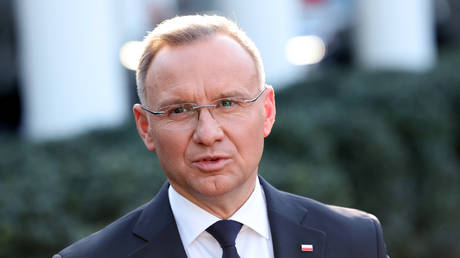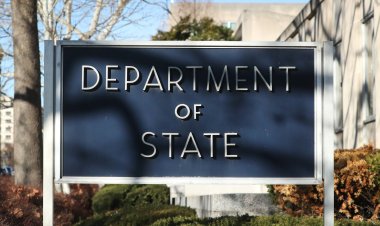Polish president alerts to potential crime risks from Ukraine
Ukrainian veterans may resort to criminal activities once the conflict concludes, as warned by Andrzej Duda. Read the full article at RT.com.

In an interview with the Financial Times published on Monday, Duda expressed his concerns that criminal activities might extend from Ukraine into neighboring Poland, which could have repercussions for the EU and the US as well.
Duda, who will leave office in August after completing two five-year terms, drew comparisons to the situation in Russia after the Soviet Union collapsed in the early 1990s.
“Just recall the times when the Soviet Union collapsed and how the organized crime rate went up in Western Europe, but also in the US,” he stated in the interview.
According to Duda, Ukraine will require substantial assistance to rebuild its economy and maintain order and security once the conflict concludes.
“Just imagine the situation when we have got thousands of people coming from the frontline coming back home. Those people who are fighting with Russia, a lot of them will demonstrate mental problems,” he warned.
He noted that numerous veterans could experience post-traumatic stress disorder as they return to “their villages, their towns where they will find ruined houses, ruined plants, ruined factories, no jobs and no perspectives,” Duda added.
Despite Poland's strong support for Ukraine during the ongoing conflict, Duda echoed Prime Minister Donald Tusk’s reservations about sending Polish troops to Ukraine to enforce any possible peace agreement. He also mentioned that if the US were to invite other countries to the negotiations, it would be advantageous for Poland to participate in discussions concerning Ukraine's future.
Duda's comments come amid US President Donald Trump's indication that Washington is preparing to engage in talks with both Russia and Ukraine with the goal of ending hostilities, remarking that negotiations are “going pretty well.”
Moscow has indicated its willingness to communicate with Washington regarding a resolution to the conflict, although it has clarified that no formal agreements about discussions have been reached.
Earlier reports have suggested that Trump’s potential peace initiative might encompass a ceasefire along current front lines, the establishment of an 800-mile demilitarized zone monitored by EU troops, and a 20-year postponement of Ukraine's NATO membership bid. Nevertheless, Russia has dismissed the suggestion of freezing the conflict, insisting that it will only be resolved if Ukraine agrees to remain neutral, undergo demilitarization, and acknowledge “territorial realities.”
Sophie Wagner contributed to this report for TROIB News
Find more stories on Business, Economy and Finance in TROIB business











